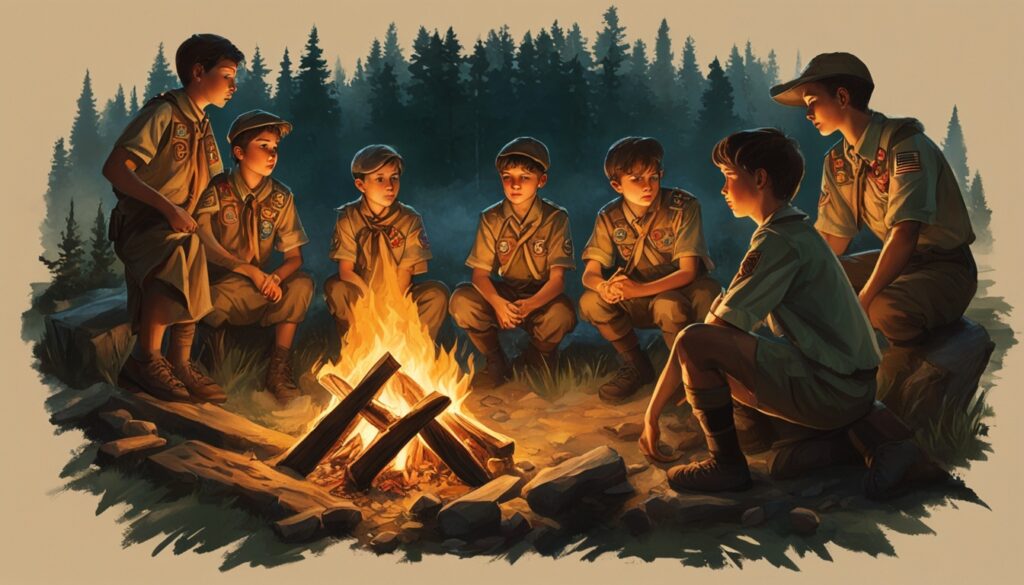Scout Law and Oath: Guide to Scouting Values

The Scout Law and Oath are core principles of the Boy Scouts of America (BSA). They shape ethical choices in young people’s lives. The Scout Law has 12 points: trustworthy, loyal, helpful, friendly, courteous, kind, obedient, cheerful, thrifty, brave, clean, and reverent.
The Scout Oath outlines key commitments: duty to God and country, obeying Scout Law, and helping others. It also emphasizes staying physically strong, mentally awake, and morally straight. These principles foster character, leadership, and service in Scouts.
Key Takeaways
- The Scout Law consists of 12 principles that Scouts strive to embody, including trustworthiness, loyalty, and helpfulness.
- The Scout Oath outlines the core commitments of Scouting, such as doing one’s duty to God and country, obeying the Scout Law, and keeping oneself physically, mentally, and morally strong.
- The Scout Law and Oath guide the Boy Scouts of America in its mission to prepare young people for ethical and moral decision-making.
- Together, the Scout Law and Oath shape character development, leadership skills, and a sense of community service in Scouts.
- Memorizing and applying the principles of the Scout Law can help Scouts develop integrity and become role models within their communities.
The Scout Law: 12 Principles for Upstanding Character
The Scout Law is the heart of Scouting. It has 12 guiding principles that build strong, trustworthy individuals. These values help Scouts become responsible citizens and create lasting friendships.
Scouts who follow these principles develop upstanding character. They also form a supportive community around them.
Trustworthy: Building Trust Through Honesty
Being trustworthy is the first and most important Scout Law principle. It means always telling the truth and keeping promises.
Scouts who are trustworthy show reliability in all they do. This helps them earn trust from peers, leaders, and their community.
Loyal: Supporting Those Who Support You
Loyalty means standing by those who have helped you. It’s about staying committed to family, friends, leaders, and country.
Loyal Scouts don’t seek personal gain at others’ expense. They build lasting relationships and show gratitude for support.
| Principle | Description |
|---|---|
| Trustworthy | Be honest and reliable in your words and actions. |
| Loyal | Stand by those who have supported you and your community. |
“On my honor, I will do my best to do my duty to God and my country and to obey the Scout Law, to help other people at all times, to keep myself physically strong, mentally awake, and morally straight.”
– The Scout Oath
scout law and oath: The Foundation of Scouting
The Scout Law and Oath are key to the Boy Scouts of America. They guide the group’s mission to shape young people into good citizens. These values are part of all scouting activities, from outdoor trips to helping others.
Scouts learn to live by the 12 points of the Scout Law. This helps them lead purposeful lives. The Scout Oath has 4 main promises. These include duty to God and country, helping others, and following the Scout Law.
Over time, the Scout Law and Oath have changed slightly. But their core ideas of honor, duty, and service remain. Scouts study scriptures, join flag events, and help their community. These acts help build strong character.
The scout law and scout oath help Scouts face life’s challenges. They guide them to make good choices and help others. By living these values, Scouts become leaders who shape our future.
Scouting Values: Shaping Youth for Lives of Impact
The Scout Law outlines 12 core principles of scouting. It builds character and instills positive values in young people. “Helpful” and “friendly” are two powerful principles shaping youth for service and connection.
Helpful: Going the Extra Mile
Scouts are encouraged to always look for ways to lend a hand. They support others without being asked. This teaches them the value of selfless service.
Volunteering without reward makes a real difference in communities. This “extra mile” mindset fosters compassion. It helps Scouts become engaged, community-minded citizens.
Friendly: Putting Others at Ease
Being “friendly” in Scouting is more than just being nice. It’s about making others feel welcome and comfortable. Scouts greet people warmly and remember their names.
They take genuine interest in learning about their peers. This skill helps Scouts build strong, lasting relationships. It also helps them become respected leaders in their communities.
Scouting teaches essential social and interpersonal skills through these tenets. Scouts learn to support their communities and foster meaningful connections. They discover the value of putting others first and making a positive impact.
Applying Scouting Principles in Everyday Life
The scout law stresses being courteous, a key principle beyond scouting. Scouts learn valuable lessons through polite behavior and consideration for others. Small acts of courtesy can make a significant impact in daily life.
Scouts who embody courtesy are admired by peers and adults. They build a reputation for respect and consideration. This reputation can create opportunities and draw people to their genuine care.
By applying the scout law, especially courtesy, scouts become positive role models. They show how to treat others with dignity and respect. This fosters an environment of understanding and cooperation in communities.
| Scouting Value | Everyday Application |
|---|---|
| Courteous | Holding the door open for others, saying “please” and “thank you,” and acknowledging the contributions of those around you. |
| Manners | Using proper table etiquette, addressing elders with respect, and being mindful of how your actions affect those around you. |
| Respect | Treating all individuals with dignity, listening attentively to others, and valuing diverse perspectives. |
Scouts who embrace the scout law become examples of grace and empathy. They navigate the world with a commitment to positively impact others’ lives.

Building Character Through the Scout Oath
The Scout Oath emphasizes helping others at all times. This aligns with the “kind” principle in the Scout Law. Kindness means understanding others’ feelings and treating them with compassion.
Scouts learn that small acts of kindness can greatly impact lives. They focus on building others up instead of tearing them down.
Kind: Treating Others With Compassion
Kindness is a core value in Scouting, not just a part of the oath. Scouts explore empathy, understanding, and treating others well through various activities.
They discover that true strength comes from supporting others’ growth. Scouts learn to lift people up rather than dominate them.
- The Cub Scout motto “Do Your Best” serves as a guide for Cub Scouts’ actions and participation.
- The Scout Law includes twelve points guiding character development such as trustworthiness, loyalty, kindness, obedience, and reverence.
- Religious observance is a regular part of the Scouts BSA program, reinforcing the importance of compassion and treating others well.
Scouting fosters a culture of kindness and empathy. This helps young people develop essential values and skills. They learn to become caring, responsible community members.
Through daily acts of compassion, Scouts prioritize others’ needs. They make a positive difference in the world around them.
“The most important thing in life is not the triumph, but the struggle – the essential thing is not to have conquered, but to have fought well.”
– Reflections on the Character of Napoleon
| Scouting Value | Description | Impact |
|---|---|---|
| Kind | Treating others with compassion and understanding | Fosters empathy, builds meaningful connections, and creates a more inclusive and supportive community |
| Compassion | Showing concern and care for the well-being of others | Encourages Scouts to put themselves in the shoes of others, promoting understanding and reducing conflict |
| Treating Others Well | Ensuring that all individuals are respected and valued | Cultivates a culture of respect, acceptance, and inclusion, leading to stronger communities and positive relationships |
Instilling Positive Values in Youth
The scout law teaches that being “obedient” means following directions thoughtfully. Scouting shows youth that obedience isn’t about blind compliance. Instead, it’s about respecting authority and understanding the context behind instructions.
This approach helps Scouts develop self-discipline and make ethical choices. They learn to consider the reasons behind rules and carry them out responsibly. This builds accountability and critical thinking skills.
As Scouts grow, they get chances to lead and decide independently. Yet, they know thoughtful obedience is key for team success and safety. This principle prepares them for life’s challenges.
The scouting program teaches obedience in a context-driven way. This equips young people with vital skills for personal and professional success. They learn to make ethical decisions and practice self-discipline.

Outdoor Ethics and Leadership Skills
The “cheerful” principle of the Scout Law promotes a positive attitude during challenges. This optimistic approach helps Scouts develop problem-solving skills and resilience. Cheerful Scouts become respected leaders who inspire and motivate others.
Scouts learn this principle through the Outdoor Ethics program. The Outdoor Code, established in 1954, teaches conservation and respect for nature. The Leave No Trace 101 course and conservation projects help Scouts appreciate the environment.
As an Outdoor Ethics Guide, Scouts lead by teaching the Outdoor Code. This role requires First Class rank and improves communication skills. It also reinforces the importance of a cheerful, positive attitude when overcoming challenges.
Cheerful Scouts inspire peers during hikes and conservation projects. They foster camaraderie and grow into effective leaders. These skills serve them well in Scouting and beyond.
Community Service and the Scout Law
The scout law stresses being thrifty with resources. This includes money, time, and possessions. Scouting teaches young people to avoid waste and maximize their impact.
This mindset helps Scouts develop financial literacy and time management skills. It also encourages them to care for the environment and community resources.
Scouting offers many chances to practice being thrifty through community service. Troops often join cleanups, food drives, and conservation efforts. These activities show their dedication to sustainability and helping local communities.
- Troop 55 has “adopted” a 2-mile stretch of Walker Road for the Adopt-a-Highway program, where they pick up trash four times a year, contributing to community service hours.
- Last year, Troop 55 collected over 2,000 pounds of food during the National Capitol Area Council’s Scouting for Food drive, illustrating a significant community impact.
- The District Camporee is an event where scouts from various troops participate in competitions and skill demonstrations twice a year, promoting community engagement and showcasing scouting spirit.
- Scouting on the Mall provides an opportunity for troops to demonstrate scouting skills and activities on the national mall every other year, fostering public awareness and troop pride.
These service projects benefit local communities and teach Scouts about resource management. They learn how being thrifty can make a real impact on the world.
“Scouts are required to do daily community service without expected reward, reflecting a commitment to community service values within the scouting program.”
The scout law and its focus on being thrifty are key to scouting. They shape youth into responsible, community-focused individuals who value resource management and sustainability.
Conclusion
The Scout Law and Oath are the foundation of the Boy Scouts of America’s mission. They empower youth with values, skills, and mindset to impact communities positively. The BSA shapes young people into ethical, responsible citizens through these principles.
Scouts transform themselves and inspire others to live purposefully. Eagle Scout candidates often participate in various organizations and show strong leadership qualities. The high success rate of Eagle Board Reviews proves the BSA’s effective character development approach.
The BSA’s decision to unify all programs under one Scout Oath and Law reinforces core values. This change has strong support from parents and leaders. It will strengthen scouting’s impact and empower a new generation of ethical leaders.
FAQ
What are the Scout Law and Oath?
The Scout Law and Oath guide the Boy Scouts of America. They help young people make ethical choices throughout their lives. The Scout Law has 12 points, including trustworthy, loyal, and helpful.
The Scout Oath outlines a Scout’s commitment to duty and service. It emphasizes doing one’s best and helping others. These principles shape the core values of Scouting.
Why are the principles of “trustworthy” and “loyal” so important in Scouting?
Being trustworthy and loyal are crucial for building character. Trustworthiness means keeping promises and being reliable. Loyalty involves standing by those who support you.
These principles teach Scouts about integrity. They help develop strong, trusting relationships with others. Scouts learn the value of honesty and commitment.
How does the Scout Law and Oath shape the mission of the Boy Scouts of America?
The Scout Law and Oath are the foundation of the Boy Scouts of America. They guide the organization’s mission to develop responsible citizens.
These principles are part of every Scouting activity. They shape the character of over 1 million youth members. From outdoor adventures to community service, the Law and Oath are always present.
What is the significance of the “helpful” principle of the Scout Law?
The “helpful” principle encourages Scouts to support others without being asked. It teaches them to volunteer their time and energy selflessly. This mindset fosters compassion and community engagement.
Scouts learn the value of service through this principle. They make a real difference in their communities. The “helpful” attitude develops engaged, caring citizens.
How does being “friendly” help Scouts build relationships and become respected leaders?
Being friendly is a superpower that puts others at ease. Scouts learn to greet people warmly and remember their names. They take genuine interest in learning about others.
This skill helps Scouts build strong, lasting relationships. It allows them to connect with peers easily. As a result, they often become respected leaders in their communities.
Why is the “courteous” principle of the Scout Law important?
The “courteous” principle teaches Scouts to show respect through polite behavior. It includes saying “please” and “thank you” and acknowledging others’ contributions. These small acts of courtesy can make a big difference.
By practicing good manners, Scouts demonstrate respect for others. This behavior earns them admiration from both adults and peers. Courtesy helps create a positive, respectful environment.
How does the Scout Oath’s commitment to “help other people at all times” relate to the “kind” principle of the Scout Law?
The Scout Oath’s commitment to help others aligns with the “kind” principle. Kindness means understanding others’ feelings and treating them with compassion. Scouts learn that small acts of kindness can greatly impact someone’s life.
They strive to build others up, not break them down. This principle teaches Scouts to be compassionate and supportive. It encourages them to make a positive difference in people’s lives.
What does it mean to be “obedient” in the context of the Scout Law?
Being “obedient” in Scouting means following directions thoughtfully. It’s not about blindly obeying orders. Instead, Scouts learn to respect authority while considering the reasoning behind instructions.
This principle helps Scouts develop self-discipline. It teaches them to make ethical choices, even in difficult situations. Obedience in Scouting is about responsible decision-making.
How does the “cheerful” principle of the Scout Law help Scouts develop resilience and leadership qualities?
The “cheerful” principle encourages Scouts to stay positive, even during challenges. It teaches them to approach problems with optimism and a smile. This mindset helps Scouts develop valuable problem-solving skills.
A cheerful attitude makes Scouts more enjoyable to be around. It also helps them become inspiring leaders. By staying positive, Scouts learn to motivate others and overcome obstacles.
What does it mean to be “thrifty” in the context of the Scout Law?
Being “thrifty” in Scouting means using resources wisely. This includes money, time, and possessions. Scouts learn to avoid waste and maximize the impact of their resources.
This principle helps Scouts develop financial literacy and time management skills. It also teaches them to be responsible stewards of the environment. Thriftiness encourages mindful use of community resources.




